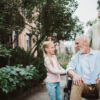”Question: How can I better understand Alzheimer's?
Reading time: 7 Minutes
MWi Hack:
- Alzheimer’s impacts 7M+ Americans but early help + Mediterranean diet + exercise + strong caregiver networks = better life quality for everyone affected.
MWi Summary:
-
- 7M Americans battle Alzheimer’s, making it a national health crisis affecting families, friends and caregivers across communities
- Early detection is crucial – symptoms start with memory loss and progress to affect language, judgment, movement and daily tasks
- While no cure exists, FDA-approved medications plus professional help (social workers, therapists) can slow progression
- Prevention strategies focus on lifestyle: Mediterranean diet, regular exercise, social connections, and quality sleep are key defenses
- Caregivers (often unpaid family members) need strong support systems – they manage everything from medications to mobility, making respite care and community resources essential for their wellbeing
November is Alzheimer’s Awareness Month. Did you know that almost 7 million people in America live with Alzheimer’s? The impact is even larger when you consider the many family members, friends, and caregivers of the loved ones with the disease.
In this article, we’ll outline 5 things you should know about Alzheimer’s for Alzheimer’s Awareness Month.
- Alzheimer’s Disease: What Is It?
- Getting Help For Alzheimer’s Disease
- Prevention & Healthy Aging
- The Impact On Caregivers
- How You Can Spread Awareness for Alzheimer’s Awareness Month
1. Alzheimer’s Disease: What Is It?
Alzheimer’s disease is a progressive disease that creates damage to brain cells. Because of this, a person with Alzheimer’s dementia can have challenges with:
- Memory loss
- Language
- Judgment and problem-solving skills
- Mood and behavior
- Everyday tasks like walking, eating, and getting dressed
People often say “Alzheimer’s” and “dementia” to refer to the same thing. However, dementia is an umbrella term–it’s not a diagnosis on its own. Finding out what kind of dementia your loved one has is important. It can help you understand underlying causes, know what to expect, and find suitable treatment.
Stages
There are different stages of Alzheimer’s dementia. When a person starts developing symptoms that don’t necessarily have a large effect on daily life, they’re typically deemed to have mild cognitive impairment. Once symptoms intensify and begin affecting daily life, the stages progress from mild to moderate and severe.
2. Getting Help For Alzheimer’s Disease
Treatment
There is no cure for Alzheimer’s; however, there are approved drugs that can be prescribed to slow disease progression and address dementia symptoms.
Non-drug treatments are also available to help improve quality of life. Professionals like social workers, occupational therapists, speech-language pathologists, and physical therapists can help people with Alzheimer’s:
- Maintain function in everyday tasks like personal care, eating, and transportation.
- Address mobility challenges and prescribe mobility equipment like walkers and wheelchairs.
- Implement fall and risk prevention strategies.
- Suggest tools and tips to help with communication challenges or behavior changes.
- Continue engaging in meaningful activities.
- Connect with helpful resources in the community.
You can contact your doctor or a care navigator to help build your healthcare team and receive support from an interdisciplinary team.
Care Navigator
The medical system is complex, and this can leave people with Alzheimer’s and their caregivers feeling confused about what to do or who to turn to next.
Care navigation programs are available to help. A care navigator or patient navigator can assist with pointing you in the right direction when it comes to finding the resources or professionals you need. They can:
- Provide education about Alzheimer’s dementia.
- Provide information about healthcare professionals that would be relevant to you.
- Help with care coordination. For example, managing appointments and helping with referrals.
- Bring awareness to financial and legal implications you should know about.
- Refer you to community resources like meal services or support groups.
- Highlight financial resources to access after receiving an Alzheimer’s diagnosis.
- Provide coaching and support as you navigate through the unique challenges that Alzheimer’s brings.
Helpful Resources
To learn more about Alzheimer’s disease, find local resources, and get involved, you can browse reputable online resources like the Alzheimer’s Association or the Alzheimer’s Society.
3. Prevention & Healthy Aging
There is no proven or exact science when it comes to preventing Alzheimer’s disease. The development of Alzheimer’s, just like with many other diseases, is due to a number of interacting factors. Some of these factors, like genetics, cannot be prevented or changed. However, there are several lifestyle factors to focus on that can help reduce the risk of developing Alzheimer’s dementia.
To help reduce the risk of developing Alzheimer’s, you can:
- Participate in regular physical activity and exercise
- Eat a heart-healthy diet, like the Mediterranean diet
- Maintain strong social connections and community
- Maintain proper sleep habits
Aditionally, you should implement injury prevention strategies to avoid head trauma. For example, wearing a helmet when riding a bike or using fall prevention strategies in your home.
4. The Impact On Caregivers
Many family members, friends, and community members help provide daily care to people with Alzheimer’s. These caregivers are so important in helping loved ones with Alzheimer’s stay at home as long as possible. They not only reduce healthcare costs but also help maintain the quality of life of the person with Alzheimer’s. These caregivers are typically unpaid and often make many personal sacrifices to help their loved ones after receiving their diagnosis.
Caregivers help their loved ones with Alzheimer’s with many aspects of care. Examples include:
- Providing hands-on help with personal care like bathing and toileting
- Managing medications
- Meal preparation and feeding
- Scheduling appointments
- Providing transportation and mobility assistance
- Managing behavior changes
- Managing financial and legal responsibilities
- Supporting engagement in meaningful activities
It’s common for caregivers to feel stress and even burnout over time, especially as the disease progresses to be more severe and managing care becomes more complex. It’s often a thankless role but an important one. There are resources available to help. The Alzheimer’s Association outlines ways for caregivers to get support, like:
- Joining a support group to connect with peers who relate to what they’re experiencing
- Implementing safety and emergency plans
- Accessing available financial resources or hands-on help like respite care
Educational platforms like Trualta can also help caregivers. Trualta provides strategies and tools to make caregiving easier and connects caregivers with peers to bring social, mental health, and emotional support, as well as practical help from people who understand.
5. How You Can Raise Awareness For Alzheimer’s Awareness Month
Now that you’ve learned about Alzheimer’s and its impact, let’s take a look at how you can raise awareness for Alzheimer’s this November for Alzheimer’s Awareness Month.
The Alzheimer’s Foundation of America suggests that you can:
- Wear the color teal. Teal has been chosen as the calming color to represent Alzheimer’s Awareness Month. Show support by wearing teal to spark the conversation and bring awareness to the millions of people impacted by Alzheimer’s disease.
- Share information and resources about Alzheimer’s. Save and share factual images and posts like this flyer describing facts about Alzheimer’s Disease, and any links to helpful resources you know about, like community support or helpful websites. These can be shared face-to-face with community members or friends, or online on social media platforms.
MWi would like to thank Trualta for sharing these insights with our community. Click the button below to be directed to the original content:






